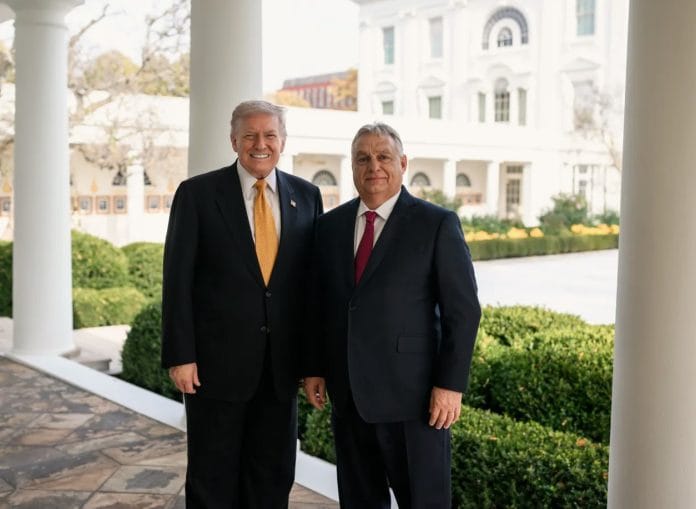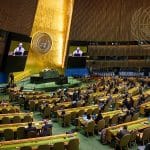For a while, it appeared as if the war in Ukraine was again a top priority in the White House, but ultimately that turned out to be a mirage, with U.S. President Donald Trump focusing increasingly on resolving the painful and expensive shutdown of the U.S. government, which has just ended. He has also been facing attacks from vocal members of his base for spending too much time hosting international visitors and making foreign trips, and now, as of late, dealing with the running battle over the Epstein files.
Nevertheless, Trump and longtime ally Hungarian Prime Minister Viktor Orban met at the White House on November 7. The main headline from the meeting was simple, Orban secured a one-year waiver from the October U.S. sanctions targeting purchases of Russian oil and gas via the Druzhba (Friendship) oil and TurkStream (via Bulgaria) gas pipelines.
As Hungary is heavily reliant on Russian energy (about 86 percent of its oil and 74 percent of its gas), the country risked major economic disruptions without an exemption, which is broadly in line with exceptions/permissions Hungary had already secured from its EU partners, although shorter. A cutoff of Hungary’s Russian gas imports, from all sources, could cost the country more than 4 percent of its GDP, according to the International Monetary Fund (IMF).
Orban has claimed to Hungarian media that without the Trump sanctions exemptions local utility bills “could have gone up by up to three times in December.” Capping those bills by various means has been a central plank of his popularity in Hungary for years, according to BBC reporting. Orban is still seeking a visit by Trump to Budapest, with or without Russian President Vladimir Putin, to bolster his chances against stiff competition in upcoming elections planned for April, although nothing was announced on this point after the Trump meeting.
Beyond election concerns, Orban’s key argument to Trump for a sanctions exemption is that Hungary is a landlocked country and has no practical alternative to Russian oil. Although once valid, Orban has been constantly pressed by EU partners and the European Commission to end the import of Russian oil, gas and nuclear fuel by the end of 2027, and the sanctions exemptions for energy imports given so far to several countries in Central Europe were reluctantly agreed in Brussels to allow them time for painful and expensive adjustment measures. Pipelines cannot be re-routed overnight, nor can energy distribution networks be immediately re-oriented. But, analysts note, the Ukraine war has been raging since 2022.
In view of the Orban deal, analysts are now wondering when Serbia’s Aleksandar Vucic will petition Trump for another exception from U.S. sanctions for Serbia’s main refinery, NIS.
Adjustment measures are working
Away from prying eyes, Hungarian energy company MOL has been steadily upgrading two of its refineries – Szazhalombatta in Hungary and the Slovnaft facility in Bratislava in neighboring Slovakia – to process Brent crude instead of the high-sulfur Urals crude which flows through Russian pipelines. Also, on November 7, MOL revealed that 80 percent of its oil needs could be directed through the Adria pipeline from Croatia, albeit with higher costs and some technical risks, such as limitations on the number of hours pumping stations could safely operate. Clearly, progress is steadily being made.
In view of this data, one wonders what Trump’s intelligence briefings would have told him ahead of the Orban meeting, and if the facts even mattered. Accordingly, the “landlocked country” proposition is no longer the deciding factor.
Argentina take two?
Orban has also claimed he arranged for a “financial shield” while meeting with Trump. “I have also made an agreement with the U.S. President on a financial shield,” Orban told reporters aboard his flight back from Washington in a video published on November 9. “Should there be any external attacks against Hungary or its financial system, the Americans gave their word that in such a case they would defend Hungary’s financial stability.” Washington has made no official announcement on this, and Orban’s remarks suggest an understanding was reached, possibly modeled on the financial guarantees extended to Argentina’s President Javier Milei, another close Trump ally, after their Washington meeting last month. Hungary’s increasingly confident opposition is demanding an explanation from Orban.
Hungary’s forint, which had weakened sharply since Orban took power in 2010 and then after the Ukraine war set off an inflationary surge, has gained about 6 percent against the euro this year, and is a top performer among central European currencies at this point for 2025.
The dealmaker in action
Supporting the visit, the U.S. State Department published a fact sheet entitled “U.S.-Hungary Relations Reach New Heights” on November 7 which details recent progress in bilateral relations from the American perspective.
Washington highlighted what it called “a new U.S.-Hungary Energy Partnership.” A major part of the U.S.-Hungary deal concerns nuclear energy technology. Hungary agreed to buy U.S. nuclear fuel rods for its Paks 1 nuclear power station ($114 million), in parallel to those bought from Russia’s Rosatom and France’s Framatome. Russian plans to finance and build the nuclear plant extension, called Paks 2, have been long delayed by technical and licensing issues. Washington’s agreement to lift nuclear sanctions on Hungary may help restart that project, but difficult issues remain unresolved.
Hungary has also agreed to buy U.S. technology to extend the short-term storage of spent nuclear fuel at Paks for between $100 million and $200 million.
Hungary also committed to buying around $600 million in U.S. liquefied natural gas (LNG), and crucially, to partner on U.S. nuclear fuel/technology, including small modular reactors (SMRs) with U.S. companies. The State Department claims this could make Budapest “a hub of the emerging Central European SMR market, deploying market-leading U.S. nuclear innovation to jumpstart a new transatlantic industry.” This agreement anchors Hungary’s long-term strategic ties with the U.S. energy/nuclear sector, which serves both countries’ interests in diversification, technology, and infrastructure.
While the State Department fact sheet is essentially a laundry list of key operational issues in the bilateral relationship, two other significant points should be highlighted:
–Hungary signed the Artemis Accords (civil space exploration) on October 22.
–Hungary announced its intent to purchase $700 million worth of U.S. defense articles via the foreign military sales program.
The bottom line after the White House meeting is clear. Orban secured substantial, immediate sanctions relief from the United States, as well as enhanced strategic connections with Washington. In exchange, Trump accepted a trade-off: it weakened his overall sanctions leverage with Moscow, boosting Russian energy earnings somewhat and upsetting allies. This decision was made in pursuit of Trump’s personal concerns, (Orban’s re-election bid) U.S. commercial advantages and the possibility of limited longer-term diplomatic gains within Central Europe. But one thing is clear, nothing is guaranteed.







